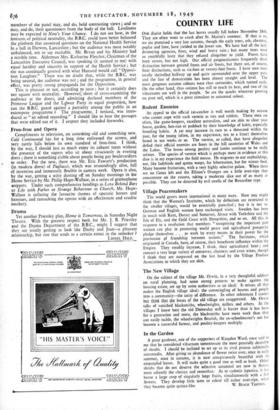COUNTRY LIFE
ONE diarist holds that the last leaves usually fall before November Nth. They are often wont to crash after St. Martin's summer. If that is ao, we arc promised a very late autumn, though the early trees, ash, chestnut, poplar and lime, have yielded to the lower sun. We have had all the leaf- destroying agencies, frost, wind and heavy rain ; but many trees were so youthfully lusty that they refused altogether to yield. Frosts have been severe, but not high. Our official prognosticators frequently draw distinction between ground frosts and air frosts, but there arc, of COUM, finer distinctions, such as six-foot or twenty-foot frosts. I have seen trees totally shrivelled halfway up and quite unwounded over the upper part, and the line of demarcation has been almost straight and level. The most gorgeous autumn colours were rhus cotinoides, which turned early. On the other hand, rhus codnus has still to reach its best, and two of the viburnums are well in the purple. So are the quicks wherever growing on poor soil, which is a great stimulant to autumnal colour.
Rodent Enemies An appeal to the official rat-catcher is well worth making by anyone who cannot cope with such vermin as rats and rabbits. These men are often, like game-keepers, excellent naturalists, and are able to clear your house, garden, hen-run or paddock by their knowledge of habit, especially breeding habits. A rat may increase its race to a thousand within the year, for the young (often, in my experience, ten to a litter) themselves breed in ten weeks or so. The vermin, so called, that have altogether defied their official enemies are foxes in the hill countries of Wales and the Lakes. The losses among poultry and lambs continue to be really serious. The species of vermin which is perhaps most in evidence at this date is in my experience the field mouse. He migrates to our outbuildings, not, like ladybirds and queen wasps, for hibernation, but for winter food. Many become fruitarians, with a very highly selective palate. When there are no Coxes left and the Ellison's Oranges are a little over-ripe they concentrate on the russets, taking a moderate slice out of as many as possible. They can be deterred by evil smells of the Renardine type.
Village Peacemakers The world grows more international in many ways. Now you might think that the Women's Institutes, which by definition are restricted to the smaller villages, would be essentially parochial ; but it is not so. German and English women have exchanged visits. Sweden has been in touch with Kent, Dorset and Somerset, Alsace with Yorkshire and the Isle of Ely, and the Gold Coast with Shropshire, and so on. All this in response to a resolution that members " recognising the important part women can play in promoting world peace and agricultural prosperity pledge themselves . . . to work by every means in their power for the pro:notion pf friendship between nations." The Institutes, which originated in Canada, have, of course, their beneficent influence within the Empire. They steadily increase, I think, their agricultural bent ; and concoct a very large variety of conserves, chutneys and even wines, though I think they arc surpassed on the last head by the Village Produte Associations to which they are akin.
The New Village On the subject of the village Mr. Orwin, in a very thoughtful address on rural planning, had some strong protests to make against the housing estate, set up by some authorities as an ideal It misses all that makes the English village ideal: the commingling of houses and people into a community—the unity of difference. In other references I cantler but think that the losses of the old village are exaggerated. Mr. Orwin talks of vanished blacksmiths, wheelwrights, millers and others. In the villages I know best the old Domesday mill is busier than it has been for a generation and more, the blacksmiths have more work than they can easily tackle, the wheelwrights flourish, the ex-schoolmaster's son has become a successful farmer, and poultry-keepers multiply.
In the Garden A great gardener, one of the supporters of Kingdon Ward, once said to me that he considered viburnum tomentosum the most generally desirable of shrubs. I should be inclined to set up as its rival prunus subhincila autumnalis. After giving us abundance of flower twice over, once in early summer, once in autumn, it is now conspicuously beautiful with ass empurpled leaves. It will make quite a good tree as well as bush. Other shrubs that do not deserve the adjective autumnal arc now in flower, most saliently the choisya and ceanothus. As to cydonia japonica, it h..s borne a large crop of singularly large fruits, simultaneously with a ft w flowers. They develop link taste or odour till rather over-ripe, whin they become quite quince-like. W. BEACI1 THOMAS.














































































 Previous page
Previous page